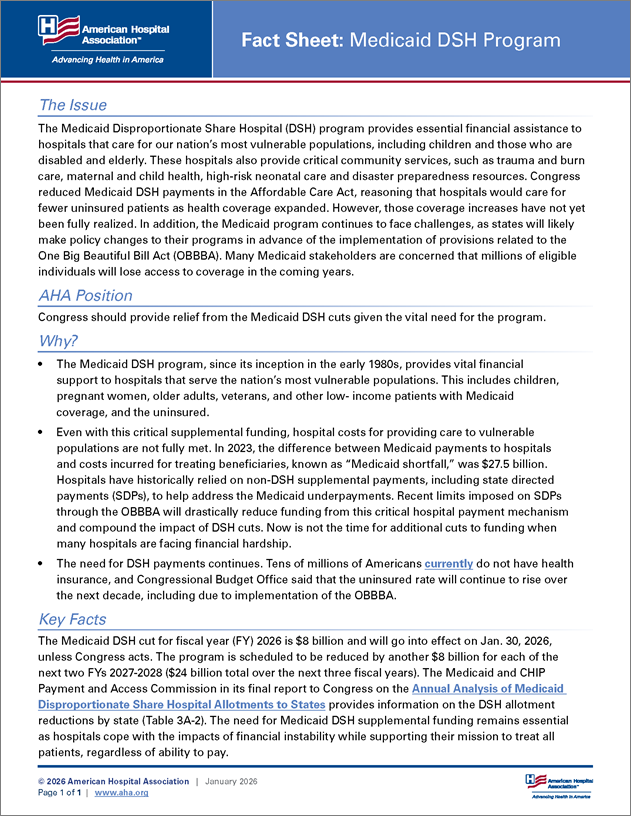

Fact Sheet: Medicaid DSH Program
Updated: January 2026
The Issue
The Medicaid Disproportionate Share Hospital (DSH) program provides essential financial assistance to hospitals that care for our nation’s most vulnerable populations, including children and those who are disabled and elderly. These hospitals also provide critical community services, such as trauma and burn care, maternal and child health, high-risk neonatal care and disaster preparedness resources. Congress reduced Medicaid DSH payments in the Affordable Care Act, reasoning that hospitals would care for fewer uninsured patients as health coverage expanded. However, those coverage increases have not yet been fully realized. In addition, the Medicaid program continues to face challenges, as states will likely make policy changes to their programs in advance of the implementation of provisions related to the One Big Beautiful Bill Act (OBBBA). Many Medicaid stakeholders are concerned that millions of eligible individuals will lose access to coverage in the coming years.
AHA Position
Congress should provide relief from the Medicaid DSH cuts given the vital need for the program.
Why?
- The Medicaid DSH program, since its inception in the early 1980s, provides vital financial support to hospitals that serve the nation’s most vulnerable populations. This includes children, pregnant women, older adults, veterans, and other low- income patients with Medicaid coverage, and the uninsured.
- Even with this critical supplemental funding, hospital costs for providing care to vulnerable populations are not fully met. In 2023, the difference between Medicaid payments to hospitals and costs incurred for treating beneficiaries, known as “Medicaid shortfall,” was $27.5 billion. Hospitals have historically relied on non-DSH supplemental payments, including state directed payments (SDPs), to help address the Medicaid underpayments. Recent limits imposed on SDPs through the OBBBA will drastically reduce funding from this critical hospital payment mechanism and compound the impact of DSH cuts. Now is not the time for additional cuts to funding when many hospitals are facing financial hardship.
- The need for DSH payments continues. Tens of millions of Americans currently do not have health insurance, and Congressional Budget Office said that the uninsured rate will continue to rise over the next decade, including due to implementation of the OBBBA.
Key Facts
The Medicaid DSH cut for fiscal year (FY) 2026 is $8 billion and will go into effect on Jan. 30, 2026, unless Congress acts. The program is scheduled to be reduced by another $8 billion for each of the next two FYs 2027-2028 ($24 billion total over the next three fiscal years). The Medicaid and CHIP Payment and Access Commission in its final report to Congress on the Annual Analysis of Medicaid Disproportionate Share Hospital Allotments to States provides information on the DSH allotment reductions by state (Table 3A-2). The need for Medicaid DSH supplemental funding remains essential as hospitals cope with the impacts of financial instability while supporting their mission to treat all patients, regardless of ability to pay.

